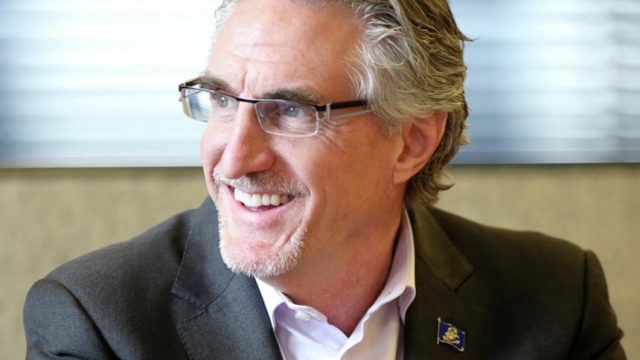Governor Burgum Is Saying the Right Things About the Bloated University System, but Does He Have the Courage of His Convictions?

ND Gov. Doug Burgum meets with the Grand Forks Herald editorial board Wednesday to discuss the 2017 legislative session. photo by Eric Hylden/Grand Forks Herald
Governor Doug Burgum should call for some of North Dakota’s college campuses to be closed.
He stopped short of doing that during recent discussions with the editorial boards of the Grand Forks Herald and Fargo Forum – “He didn’t show any favor for eliminating NDUS schools” – but the logical conclusion from the arguments he made about higher education during those interviews is that some of the schools must be closed.
“What’s driving that, the root cause, is not North Dakota’s financial situation,” Burgum said, citing statistics which indicate high levels of per capita state investment in higher education. Rather, he said, the rate of progress in communications technology has increased the ability to transmit information and gain an education outside the bounds of campus lecture halls.
“Knowledge transfer can occur anytime, any place, any location,” he said. “We have to understand that that is going to cannibalize some of what universities have done in the past.”
Though research capabilities and specialized programs are less likely to be disrupted in the near future, Burgum said online access to a wide range of coursework calls into question the value of a more traditional, campus-based collegiate experience.
The governor said that value will vary among the 11 institutions of the NDUS though he said the underlying “business model” which underpins the system as a whole is under threat. He didn’t show any favor for eliminating NDUS schools but said economic forces and ease of access to online education would likely prompt some hard thought “in terms of delivery points.”
Burgum said defending any specific physical location for a state institution that could be largely replaced with a digital platform amounts to a sort of state-subsidized jobs program. North Dakotans “cling” too tightly to “the idea of location,” he said.
The Governor is 100 percent, spot-on accurate. His comments are like a breath of fresh air.
North Dakota has too many public universities, and those universities are being operated in a fashion that is quickly becoming outdated.
To the first point, per numbers from the North Dakota Department of Public Instruction, our state’s high schools consistently graduate less than 8,000 students per year:
And yet, for some reason, we have eleven public institutions of higher education operated by the North Dakota University System.
If you’ve ever wondered why the universities deploy controversial policies like tuition waivers, it’s because our state simply doesn’t produce enough of its own students to justify eleven campuses. That’s why, as the state’s universities have pushed for endless campus expansion, the percentage of out of state students has soared. I ran the numbers a couple of years ago. I don’t have numbers for the most recent years at my fingertips, but the trend is pretty clear:
I’m not arguing against attracting students from out of state. Our state has a chronic labor shortage. If our universities can attract students from other parts of the country/world to come here, get an education, then take a job and put down roots that’s a win for North Dakota.
Unfortunately, while our state’s schools do a good job of bringing out of state students in, most of those students aren’t staying.
We need a better approach. I think that’s what Burgum is talking about.
Many of the institutions in our state are defended not because they’re necessary but because, as Burgum says, they provide jobs and economic stimulus to the communities they’re in. But those are pretty shoddy justifications for operating a school. Public universities should be operated to serve students, not as a jobs program (to use Burgum’s term) for bureaucrats and faculty.
So what if we shut down some of the state’s more extraneous schools and focused the resources we’re spending on them on the remaining schools? It would be a far more efficient use of our state’s resources.
Unfortunately, the obstacle is parochial politics. Lawmakers, local officials, and even local media outlets will go to war over even the hint of shutting down a state facility in their area. Witness the fight over the Life Skills and Transition Center in Grafton this legislative session. Which is no doubt why Burgum, despite making the intellectual case for the consolidation of our state’s institutions of higher education, stopped short of actually calling for it.
Maybe he’s not ready to pick that political fight yet. I hope, at some point during his term, he is.






